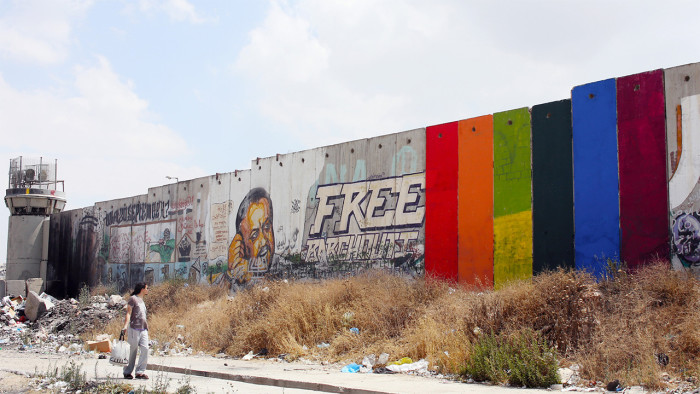Needled by a Rainbow

Palestinian artist Khaled Jarrar is currently struggeling with his country once again. After not being allowed to exit Israel in order to attend an exhibition in New York last year, the present stumbling block is a mural painted by him – the rainbow colours on the Israeli separation wall in the West Bank.
Khaled Jarrar and a fellow artist who wants to stay anonymous travelled to the wall close to the busy Qalandiya checkpoint at noon of June 29th. Three hours later a piece of the wall, that is already covered by street art extensively, blazed in seven straight colours, ranging from bright red to deep purple. Colours which are obviously related to the international LGBTQ movement.
“For me the colors of the Rainbow are the freedom colors and I love them, so I decide to paint them on the wall in a public space …. These colors are ultimately an expression of freedom. My goal is to send out a message to the whole world, which is still celebrating freedom, about the oppressed people living under military occupation, mainly embodied in the Qalandiya checkpoint and the Apartheid Wall,” Jarrar told the blog Hyperallergic.

But instead of messages of freedom and peace Jarrars problems deriving from those seven colours were just about to rise: Only four hours after the picture’s completition a group of youngsters from the occupied terrotories of the West Bank accompanied by some journalists was whitewashing the mural and had started a charged campaign against him. On social media people started calling for the artist’s abuse, rape and death, homophobic comments like this were posted: „I’ll not ever accept a homosexual in my neighborhood or my city and I’ll be so annoying from them, I really pray for god not to see any of them when am in Ramallah“.

“Queers passed through here”
What this commentator did not pay attention to is that queers are already present in Ramallah and will always be, as some other street art pieces display. And on the other hand Jarrar’s art work met a lot of approval as well. A young student mentioned: „I thought, ‘woah, that took courage to do that’. I am a supporter of gay marriage so it wasn’t irritating to me in any sense, specially that I know that this issue is a field for conflict between us and Israel … it was good for Palestine to be part of this global conversation.”
Rana Abu Diad, a 19-year-old Palestinian student who was born and raised in Jerusalem, thinks today the majority of Palestinians are against gay marriage, but the mural did spark discussion. “It was the first time I shared a pro-gay post on my wall and I saw some of my friends doing that as well,” she said. “It was probably the first time I saw that.”
And indeed the discussion on LGBTQ rights is not limited to the area of Israel and Palestine as the latest example from Turkey proofs – on 28th of June the annual Gay Pride Parade in Istanbul was shot down with water cannons and tear gas by the Turkish police (where the shot water mixed with the sunlight ironically created some beautiful rainbows).
 Turkish police shooting water on Gay Pride Parade in Istanbul 28th of June 2015
Turkish police shooting water on Gay Pride Parade in Istanbul 28th of June 2015
Concerning the alarming reactions to his mural, Khaled Jarrar some days later gave a statement appeasing many of his critics: „Everywhere, images of rainbows went viral and even the White House was lit up in rainbow colors. This got me thinking about all these international activists and ordinary citizens who were celebrating freedom for a group of people who have historically been oppressed, and the use of the rainbow as a symbol of freedom and equality and what it could represent for other oppressed groups. It also made me think of our daily struggles for equality, freedom, and justice here in Palestine. While people in the United States celebrated, and I celebrate with them for their victory, we in Palestine are still divided from our own communities and families because of the racist and bigoted policies of Israel.“
By now the artist, who became noted internationally for his contribution to the 2012 Berlin Biennial, does not fear for his live anymore. Still, there are ways to support Khaled Jarrar and his ideas: Leaned on his works for the Berlin Biennial he designed another stamp for the not existing state of Palestine in 2014, which can be purchased here and is to be used as a regular one.

